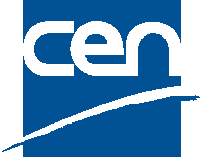 About CEN
About CENBased in Brussels, Belgium, the European Committee for Standardization (CEN) is responsible for standardization in areas other than the electrotechnical and telecommunications fields. In the fast-moving domain of information and communications technologies, CEN has created the Information Society Standardization System (CEN/ISSS). In addition to the traditional CEN Technical Committees, this makes use of open Workshops, which are standards committees created whenever there is an identified need for consensus. They are open to all interested parties and their deliverables are published by CEN as CEN Workshop Agreements (CWAs).
Detailed information is available at
www.cen.eu
Contact: Emmanuelle Ramaz
Based in Brussels, Belgium, CENELEC – The European Committee for Electrotechnical Standardisation - is officially responsible for standardisation in the electrotechnical field. Its members have been working together in the interest of European harmonisation since the 1950s, creating voluntary European Standards, which have helped to shape the European Internal Market. CENELEC works with 15,000 technical experts from at least 29 European countries. Its work directly increases market potential, encourages technological development and guarantees the safety and health of consumers, as well as the environmental protection.
Detailed information is available at
www.cenelec.org.
Contact: Catherine Vigneron
Based in Sophia Antipolis (France), the European Telecommunications Standards Institute (ETSI) is officially responsible for standardization in telecommunications, broadcasting and certain aspects of information technology within Europe. As such, it also plays a major role in global standardization. ETSI unites almost 800 members from 55 countries inside and outside Europe, including manufacturers, network operators, administrations, service providers, research bodies and users - in fact, all the key players in the telecommunications arena.
Detailed information is available at
www.etsi.org.
Contact: Yves Chauvel
The W3C was created to lead the Web to its full potential by developing common protocols that promote its evolution and ensure its interoperability. It is an international industry consortium jointly run by the MIT Computer Science and Artificial Intelligence Laboratory (CSAIL) in the USA, the European Research Consortium for Informatics and Mathematics (ERCIM) headquartered in France and Keio University in Japan. Services provided by the Consortium include: a repository of information about the World Wide Web for developers and users, and various prototype and sample applications to demonstrate use of new technology. To date, nearly 400 organizations are Members of the Consortium.
Detailed information is available at
www.w3.org.
Contact: Marie-Claire Forgue
The Open Group is a vendor-neutral and technology-neutral consortium, whose vision of Boundaryless Information Flow™ will enable access to integrated information within and between enterprises based on open standards and global interoperability. The Open Group works with customers, suppliers, consortia and other standard bodies. Its role is to capture, understand and address current and emerging requirements, establish policies and share best practices; to facilitate interoperability, develop consensus, and evolve and integrate specifications and open source technologies; to offer a comprehensive set of services to enhance the operational efficiency of consortia; and to operate the industry's premier certification service.
Boundaryless Information Flow is a trademark of The Open Group in the U.S. and other countries.
Detailed information is available at
www.opengroup.org.
Contact: Scott Hansen